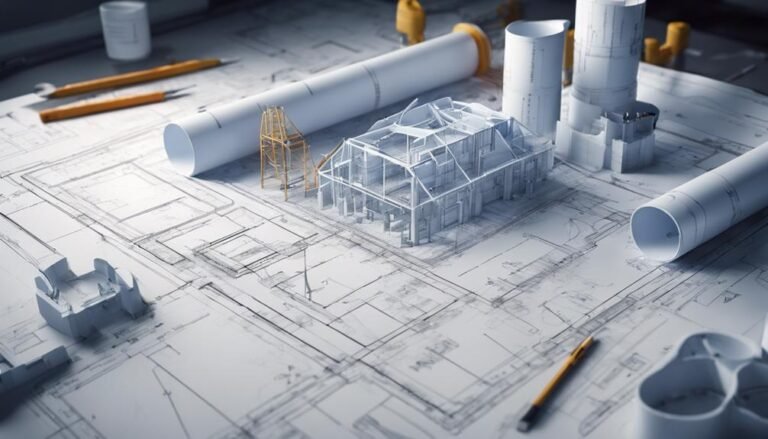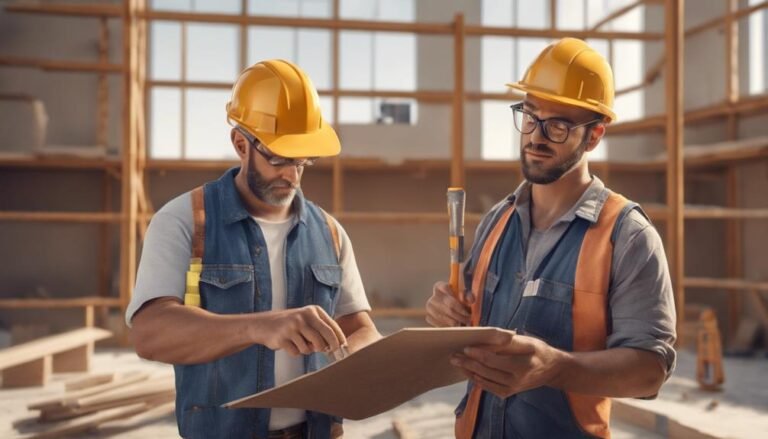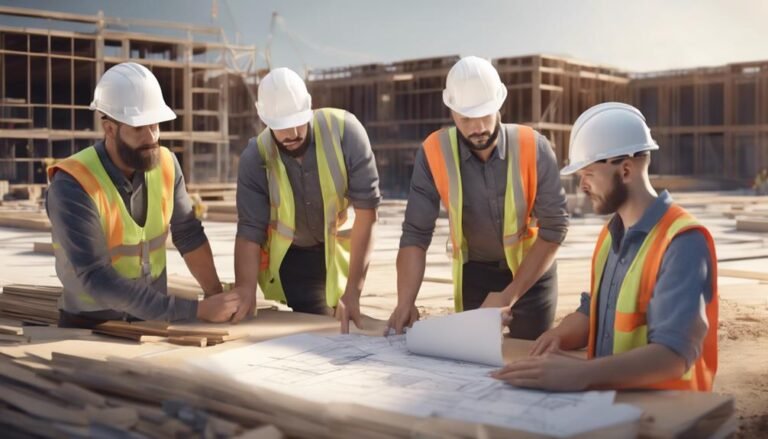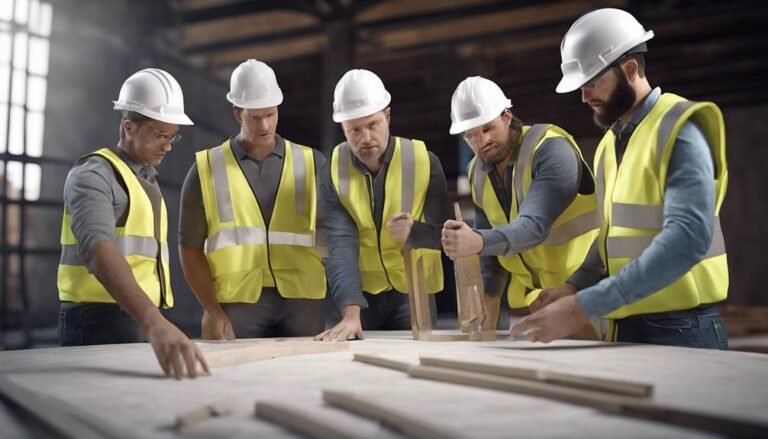The Role of Empathy in Enhancing Team Cohesion
In the construction industry, empathy plays a vital role in boosting team cohesion. By nurturing empathy, you encourage collaboration, trust, and effective communication within your team. This leads to improved problem-solving, conflict resolution, and a positive team environment where members feel valued and supported. Ultimately, empathy enhances productivity and job satisfaction among team members. Understanding the importance of empathy in construction teams can greatly impact your project’s success and overall outcomes, fostering a strong collaborative spirit that propels your team forward. Your team stands to benefit immensely from incorporating empathy into its dynamics.
Key Takeaways
- Empathy fosters collaboration, trust, and effective communication in construction teams.
- Understanding client needs through empathy enhances project outcomes.
- Open communication and shared accountability improve teamwork and project success.
- Empathy training in construction teams boosts job satisfaction and reduces turnover rates.
- Building trust and understanding with empathy enhances team dynamics and problem-solving abilities.
Importance of Empathy in Construction Teams
In the high-stakes environment of the construction industry, cultivating empathy within teams isn’t just a necessity but an essential element for fostering collaboration and achieving project success. Empathy skills play a pivotal role in enhancing team dynamics by promoting understanding, trust, and effective communication among team members.
Empathy skills enable team members to put themselves in each other’s shoes, leading to better problem-solving and conflict resolution. When individuals in a construction team can empathize with one another, they’re more likely to listen actively, consider different perspectives, and work together towards common goals. This fosters a positive team dynamic where members feel valued, respected, and supported, ultimately leading to improved productivity and job satisfaction.
Building Trust and Understanding
Building trust and understanding within a construction team is essential for fostering strong collaboration and achieving project success. Trust building is a foundational element that creates a sense of psychological safety among team members. When individuals trust each other, they’re more likely to communicate openly, share ideas, and support one another. This trust leads to better problem-solving, increased efficiency, and ultimately, improved project outcomes.
Emotional intelligence plays a significant role in building trust within a team. By being aware of your own emotions and those of your teammates, you can better navigate conflicts and understand different perspectives. Developing emotional intelligence allows you to empathize with others, communicate effectively, and build stronger relationships based on trust and mutual respect.
Enhancing Communication and Collaboration
Enhancing communication and collaboration requires fostering a culture of open dialogue and shared accountability among team members. Effective communication is the cornerstone of successful teamwork in the construction industry. By encouraging team members to openly express their thoughts, concerns, and ideas, conflicts can be addressed promptly, leading to smoother project execution. Conflict resolution plays an essential role in enhancing team dynamics. When conflicts arise, it’s important to address them constructively, focusing on finding solutions rather than placing blame.
Collaboration thrives when team members are actively engaged and feel their opinions are valued. Encouraging a collaborative environment where everyone’s input is considered helps in pooling diverse perspectives and expertise, leading to innovative solutions. Shared accountability ensures that each team member takes responsibility for their actions and commitments, fostering trust and reliability within the team.
Empathy’s Impact on Project Success
Empathy plays a pivotal role in project success by fostering team synergy and enhancing communication. Understanding the needs and perspectives of clients can lead to more tailored and successful project outcomes.
Team Synergy Boosts
To achieve peak project success in the construction industry, fostering team synergy through empathy is essential. When team members understand and support each other, projects tend to run smoother and with better outcomes.
Here are three ways team synergy boosts project success:
- Enhanced Collaboration: Empathy fosters a collaborative environment where team members feel comfortable sharing ideas and working together effectively.
- Improved Problem-Solving: Empathetic team members are better equipped to understand different perspectives, leading to more innovative and effective problem-solving approaches.
- Increased Morale: Empathy creates a positive work environment where team members feel valued and supported, leading to higher morale and motivation levels.
Understanding Client Needs
Understanding client needs plays a pivotal role in project success, influencing the direction and outcomes of construction endeavors greatly. By empathizing with clients, construction teams can tailor their approach to meet specific requirements, leading to enhanced client satisfaction and ultimately project success.
When teams actively listen to clients and understand their preferences, it fosters a collaborative environment where decisions are made with the client’s best interests in mind. This client-centric approach not only guarantees that the project meets expectations but also strengthens the relationship between the construction team and the client.
Prioritizing client satisfaction through empathy sets the foundation for successful project completion and fosters long-term partnerships within the construction industry.
Creating a Positive Work Environment
Creating a harmonious and supportive work environment is essential for fostering team cohesion in the construction industry. To enhance team morale and promote a positive workplace culture, consider the following:
- Encourage Open Communication: Establish channels for team members to share their thoughts, concerns, and ideas freely. Open communication fosters trust and transparency within the team, leading to stronger relationships and improved collaboration.
- Promote Work-Life Balance: Recognize the importance of maintaining a healthy balance between work and personal life. Encourage reasonable work hours, provide support for personal well-being, and offer flexibility when possible. A balanced lifestyle contributes to employee satisfaction and overall team harmony.
- Recognize and Reward Contributions: Acknowledge the hard work and achievements of team members. Implement a system that rewards excellence and dedication, whether through verbal appreciation, tangible rewards, or opportunities for growth. Recognizing contributions boosts morale and motivates individuals to perform at their best, creating a positive and uplifting work environment.
Overcoming Challenges Through Empathy
When tackling challenges in the construction industry, building trust with empathy can enhance team dynamics and problem-solving abilities.
By understanding and acknowledging the feelings and perspectives of your team members, you can foster a sense of unity that promotes effective communication and collaboration.
Improving communication through empathy not only resolves conflicts efficiently but also strengthens the team’s resilience in facing future obstacles.
Building Trust With Empathy
To forge strong bonds and foster collaboration within a construction team, employing empathy as a tool to build trust is essential. Building trust through empathy can help overcome challenges and create a more cohesive and productive work environment.
Here are three practical ways to enhance trust within your construction team:
- Trust Building Activities: Organize team-building exercises that promote open communication and mutual understanding among team members.
- Empathy Workshops: Conduct workshops focused on enhancing empathy skills, active listening, and perspective-taking to encourage empathy among team members.
- Transparent Communication: Foster an environment where team members feel safe to express their thoughts and emotions, promoting honest and transparent communication that builds trust.
Improving Communication Through Empathy
Building trust through empathy sets a solid foundation for improving communication within the construction team, enabling effective problem-solving and collaboration.
Active listening plays an essential role in understanding the perspectives of team members. By actively listening to their concerns, you demonstrate empathy and validate their feelings, fostering a sense of understanding and openness.
Moreover, developing emotional intelligence allows you to navigate challenging situations with empathy, promoting a harmonious work environment.
Consider organizing empathy workshops to cultivate these essential skills among team members, emphasizing the importance of empathy in communication and relationship-building.
In times of conflict, approach resolution with empathy at the forefront, seeking mutual understanding and compromise. By incorporating empathy into communication practices, you can enhance team cohesion and overall project success.
Empathy Training for Construction Teams
Incorporating empathy training into construction team development programs can greatly enhance communication and collaboration within the workforce. Empathy workshops are a valuable tool for fostering understanding and mutual respect among team members. These workshops provide a safe space for employees to practice active listening and perspective-taking, key components of building empathy within a team dynamic.
By honing emotional intelligence through these workshops, construction teams can improve their overall performance. Emotional intelligence training enables team members to better regulate their emotions, leading to more effective conflict resolution and enhanced teamwork. Additionally, incorporating empathy training into construction team development programs can lead to increased job satisfaction and reduced turnover rates.
Conclusion
To sum up, empathy acts as the glue that holds construction teams together, like a strong adhesive binding materials in a structure. By fostering understanding, trust, and communication, empathy plays a crucial role in enhancing team cohesion and ultimately project success.
Embracing empathy in the construction industry not only creates a positive work environment but also helps teams overcome challenges effectively. Empathy training is a valuable tool for cultivating strong and united construction teams.







